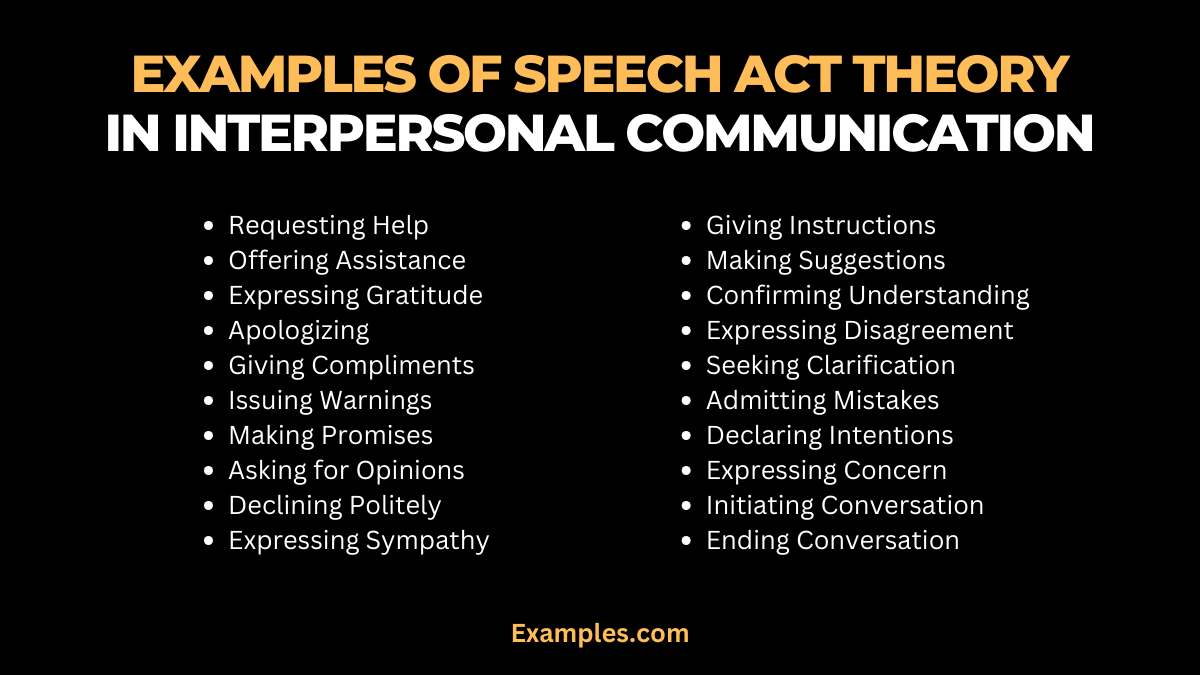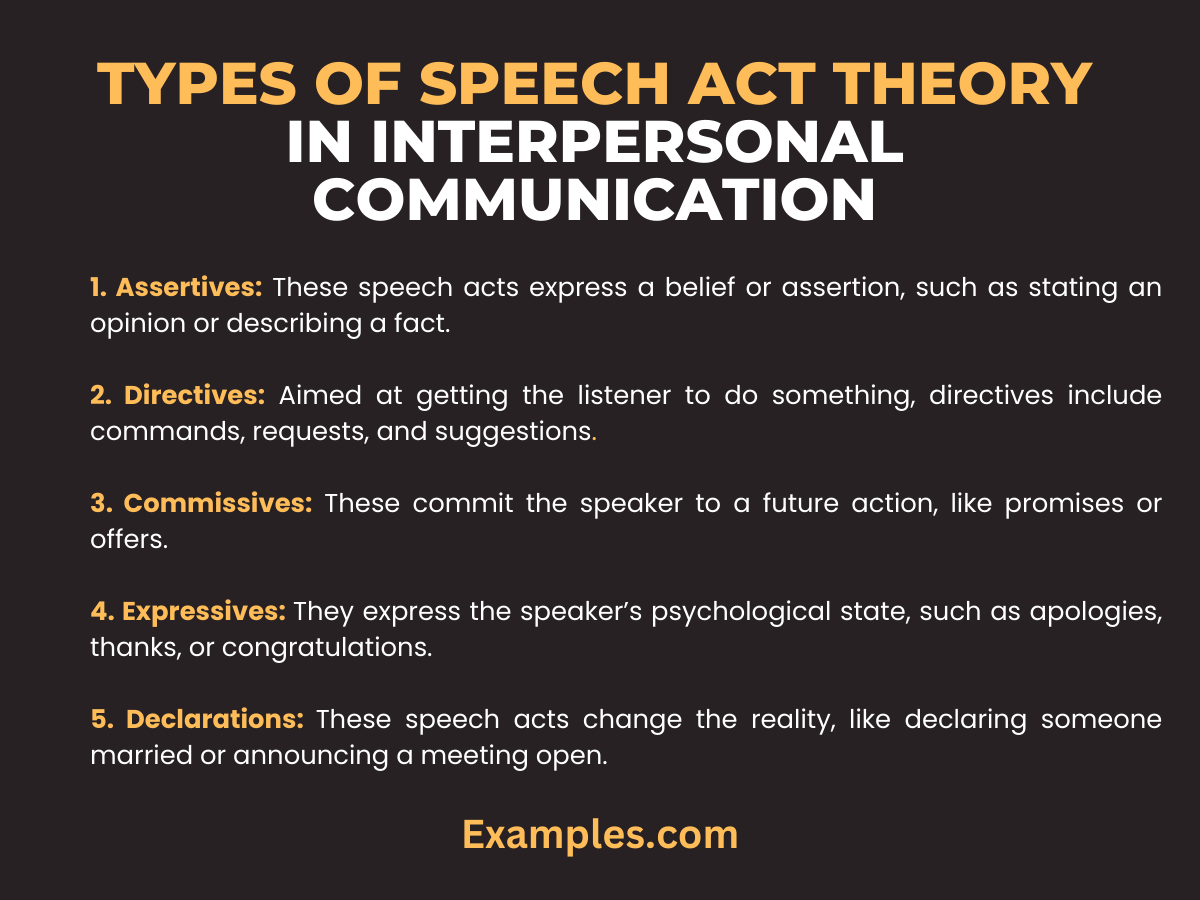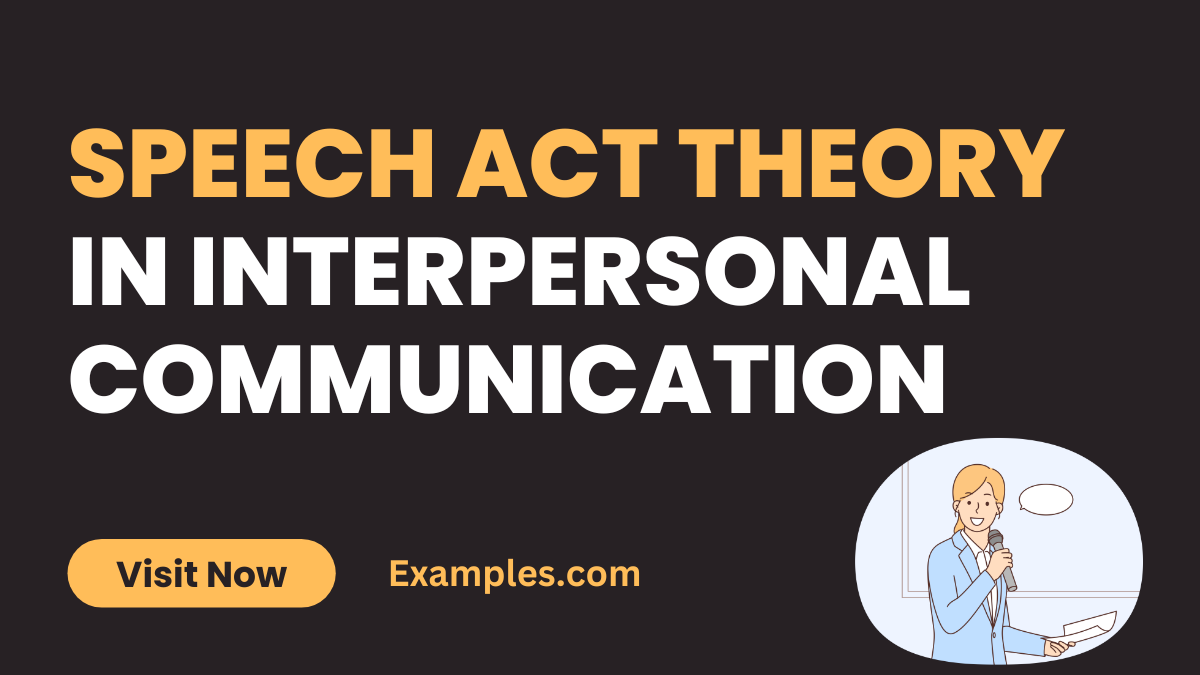Speech Act Theory in Interpersonal Communication
Explore the fascinating world of Speech Act Theory within Interpersonal Communication. This comprehensive guide delves into the nuances of verbal and non-verbal exchanges, offering insightful examples and practical applications. Understanding this theory can significantly enhance your communication skills, making your interactions more meaningful and effective. Whether you’re a student, professional, or simply keen on improving your interpersonal skills, this guide is an essential tool for mastering the art of communication.
What is Speech Act Theory in Interpersonal Communication?

Speech Act Theory is a key concept in Interpersonal Communication, focusing on the ways in which our words do not just convey information but also perform actions. At its core, it explores how language can influence our relationships and interactions. Understanding this theory helps in recognizing the deeper implications of our words and how they shape our social reality.
History
Who created: J.L. Austin and John Searle
Date: 1960
This theory emphasizes how language is used not only to convey information but also to perform actions. In the context of types of interpersonal communication, it recognizes that verbal communication extends beyond the mere exchange of information to include the performance of certain acts through words, like apologizing, promising, or requesting.
What is the Best Example of Speech Act Theory in Interpersonal Communication?

One of the best examples of Speech Act Theory in action is the use of promises in everyday conversations. When someone makes a promise, they are not just stating a fact but are committing to an action. This act of promising can build trust and strengthen relationships, showcasing how our words have the power to affect our interpersonal dynamics. Another example is the use of apologies, which can repair and maintain relationships by acknowledging mistakes and expressing regret. These instances highlight the practical implications of Speech Act Theory in daily Interpersonal Communication.
20 Examples of Speech Act Theory in Interpersonal Communication

Speech Act Theory, a pivotal concept in Interpersonal Communication, unravels how our words do more than convey information; they enact functions, shaping our social world. This theory, integral to Types of Interpersonal Communication, explores the power of language in contexts ranging from casual conversations to formal agreements. Understanding this theory enriches one’s comprehension of communication dynamics, enhancing interpersonal skills crucial in diverse settings.
- Requesting Assistance: “Could you please help me with this report?” This exemplifies a direct request, a speech act that clearly states the desired action.
- Offering Help: “I can assist you with that task.” Here, the speaker voluntarily offers support, a vital aspect of collaborative environments.
- Expressing Gratitude: “Thank you for your support.” This statement not only conveys thanks but also strengthens social bonds.
- Apologizing: “I’m sorry for the misunderstanding.” This speech act acknowledges a mistake and seeks reconciliation.
- Giving Compliments: “You did a fantastic job on that presentation.” Compliments are positive speech acts that boost morale.
- Issuing a Warning: “Be careful with that equipment.” This acts as a cautionary advice, highlighting concern for safety.
- Making Promises: “I will finish the report by tomorrow.” Promises are commitments that build trust when fulfilled.
- Asking for Opinions: “What do you think about this idea?” Seeking opinions shows respect for others’ viewpoints.
- Declining Politely: “I appreciate the offer, but I can’t commit to this.” This demonstrates the ability to refuse respectfully.
- Expressing Sympathy: “I’m sorry to hear about your loss.” It’s an empathetic response to someone’s distress.
- Instructing: “Please turn off the lights when you leave.” This direct instruction guides specific actions.
- Making Suggestions: “Maybe we could try a different approach.” Suggesting introduces new ideas diplomatically.
- Confirming Understanding: “So, you’re saying we need to revise the plan?” This clarifies and confirms the speaker’s message.
- Expressing Disagreement: “I see it differently, here’s why…” This speech act respectfully presents an opposing view.
- Seeking Clarification: “Could you elaborate on that point?” It’s a request for more information or explanation.
- Admitting a Mistake: “I was wrong about that data.” This shows accountability and willingness to correct oneself.
- Declaring Intentions: “I plan to apply for that role.” It communicates future actions or plans.
- Expressing Concern: “I’m worried about the project’s timeline.” This indicates care and attention to specific issues.
- Initiating a Conversation: “Good morning! How’s the project going?” It’s a conversational opener that fosters communication.
- Ending a Conversation: “I need to get back to work, let’s talk later.” This speech act politely signals the end of an interaction.
Main Features of Speech Act Theory in Interpersonal Communication
Speech Act Theory is a significant concept in Interpersonal Communication, offering a framework to understand how individuals use language to perform various actions. This theory, proposed by J.L. Austin and further developed by John Searle, rests on the premise that language is not only used to convey information but also to perform actions.
- Performative Nature of Language: The theory emphasizes that utterances are equivalent to actions. When someone speaks, they are not just saying something, they are doing something, for instance, making a promise or issuing an invitation.
- Illocutionary Acts: These are the core of Speech Act Theory, focusing on the intent behind the words. For example, when a speaker says, “I apologize,” the illocutionary act is the act of apologizing.
- Perlocutionary Acts: These refer to the effect of the speech on the listener. For instance, if someone’s apology (illocutionary act) makes the listener forgive them, the forgiveness is the perlocutionary act.
- Context Dependence: Speech acts are heavily dependent on the context in which they are uttered. The same phrase can have different meanings in different contexts, underscoring the importance of understanding the situation and relationship between communicators.
- Explicit and Implicit Acts: Some speech acts are explicit, such as stating “I promise,” while others are implicit and require interpretation based on context and cultural norms.
What are the Components of Speech Act Theory in Interpersonal Communication
Speech Act Theory in interpersonal communication comprises several components:
- Locutionary Act: This is the act of saying something with a specific meaning, involving grammar, vocabulary, and pronunciation.
- Illocutionary Force: It’s the speaker’s intention in uttering a specific phrase or sentence. It involves the real intention behind the words.
- Perlocutionary Effect: This is the effect that the speech act has on the listener. It may vary widely depending on individual interpretation and context.
Types of Speech Act Theory in Interpersonal Communication

- Assertives: These speech acts express a belief or assertion, such as stating an opinion or describing a fact.
- Directives: Aimed at getting the listener to do something, directives include commands, requests, and suggestions.
- Commissives: These commit the speaker to a future action, like promises or offers.
- Expressives: They express the speaker’s psychological state, such as apologies, thanks, or congratulations.
- Declarations: These speech acts change the reality, like declaring someone married or announcing a meeting open.
Speech Act Theory illuminates the power of words beyond mere conveyance of information, emphasizing their role in action. Embrace this theory by being mindful of how your words perform actions, like promising, apologizing, or requesting. Effective application involves clear expression and intent recognition, enhancing your ability to engage in meaningful and impactful interpersonal communication.



